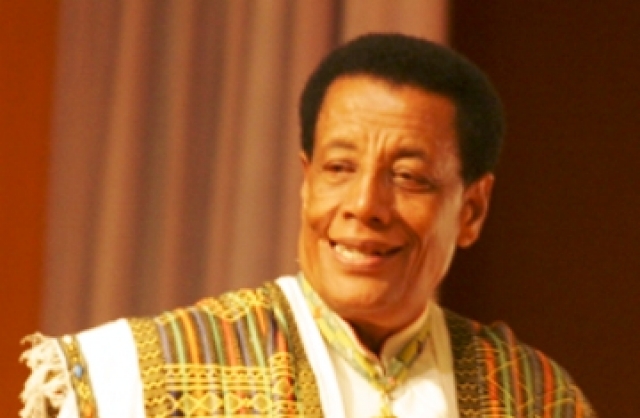Tadias Magazine
By Tadias Staff
Updated: Saturday, April 14, 2012
New York (TADIAS) – The last time Tadias Magazine interviewed Maitre Artiste Afewerk Tekle was on March 7th, 2004, following his appearance as a Keynote Speaker at Stanford University’s Pioneers Forum organized by the Stanford Ethiopian Student Union. There are few moments as electric as when Afewerk Tekle walked through the crowded auditorium to give an insider’s view of his accomplishments and life adventures. Elegantly clad in the sheer white of the Ethiopian national costume, Maitre Artiste Afewerk let his artistic mind captivate the audience as he took his red-bordered netela to demonstrate the various ways that one can wear the shawl for different public occasions, including as a graduation gown. He received a thunderous applause as he concluded his brief demonstration.
“At the end of the day, my message is quite simple,” he told the diverse audience from the university and the larger Bay Area Ethiopian community. It was the first time since the mid-1960’s that he had formally traveled to the United States to talk about his award-winning artwork.
“I am not a pessimist, I want people to look at my art and find hope,” he said. “I want people to feel good about Ethiopia, about Africa, to feel the delicate rays of the sun. And most of all, I want them to think: Yitchalal! [It’s possible!]”
Speaking about his life-long dedication to the fine arts, Maitre Afewerk Tekle instilled in his audience the importance of using art to inspire people, to uplift nations and to create an optimistic view of life. “What we do today must reflect today’s life for tomorrow’s generation and pave the way for the future generation,” he said. “Art is in every fabric of life.”
Afewerk Tekle was born in the town of Ankober in Ethiopia on October 22nd, 1932. Having grown up in an Ethiopia battling fascist Italian forces, Afewerk was acutely aware of the destruction of war and the need to rebuild his native home. Intent on acquiring skills that would allow him to contribute to Ethiopia’s restoration, the young Afewerk settled on pursuing his studies in mining engineering.
His family and friends, however, had already recognized his inner talent in the arts. Around town he was know for his drawings on walls using stones, and for possessing a curious and ever reflective mind. Despite his natural gravitation to the art world, at the age of 15 Afewerk was chosen to be sent abroad to England to commence his engineering studies.
Maitre Afewerk recalled being summoned by Emperor Haile Selassie to receive last-minute advice prior to his departure. “To this day I cannot forget his words,” the Maitre said pensively. “The Emperor began by counseling us to study, study, and study.” he told the audience. “He told us: you must work hard, and when you come back do not tell us what tall buildings you saw in Europe, or what wide streets they have, but make sure you return equipped with the skills and the mindset to rebuild Ethiopia.” Maitre Afewerk later confided that this sermon rang in his head each time he was tempted to seek the easy life, free from the responsibility of rebuilding his nation and uplifting his people.
As one of the earliest batch of African students admitted to exclusive boarding schools in England, Afewerk faced culture shock and the occasional strife caused by “English bullies.” Yet he remained steadfast in pursuing his studies. He especially excelled in courses such as mathematics, chemistry and history, but it was not long before his teachers discovered his art talent.
With the encouragement of his mentor and teachers, Afewerk decided to focus on refining his gift and enrolled at the Central School of Arts & Crafts in London. Upon completion of his studies he was accepted as the first African student at the prestigious Faculty of Fine Arts at Slade (University of London). At Slade, Afewerk focused on painting, sculpture and architecture.
Upon returning to Ethiopia, Maitre Afewerk traveled throughout the country, to every province, staying at each location for a period of up to three months, immersing himself in the study of his surroundings and absorbing Ethiopia’s historical and cultural diversity. He pushed himself to become an Ethiopian artist with world recognition.

Maitre Afewerk Tekle speaking at Stanford University in California on March 7, 2004. (Photo: TADIAS Archive)
“I had to study Ethiopian culture,” the artist said, “because an important ingredient of a world artist is to have in your artwork the flavor of where you were born.” He added, “My art will belong to the world but with African flavor.”
Above all, Maitre Afewerk worked diligently in the hopes of using his artwork as a social medium with which to highlight the history, struggles and beauty of his native home. Although he was educated abroad, he fought against what he called “the futile imitation of other artists’ works, Western or otherwise.”
With the message of rebuilding Ethiopia still ringing in his ears, Maitre Afewerk quickly decided to relinquish the ministerial post assigned to him upon completion of his university studies, and opted instead to devote his full attention to painting and exhibiting his artwork both at home and abroad.
At age 22, Afewerk Tekle held his first significant one-man exhibition at the Municipality Hall in Addis Ababa in 1954. He followed up his success by conducting an extensive study tour of art in Italy, France, Spain, Portugal and Greece, paying particular attention to collections of Ethiopian illustrated manuscripts as well as acquiring skills in stained-glass artwork.
Returning home he was commissioned to create religious art for St. George’s Cathedral. He also worked on some of the first sculptures depicting Ethiopian national heroes. His designs and inspirations were soon printed on stamps and national costumes. Most notably, he conceptualized and designed the elaborate stainedglass window artwork in Africa Hall at the headquarters of the United Nations Economic Commission for Africa.
With the income and savings he acquired by selling his artwork Afewerk designed his own 22-room house, studio and gallery, which he nicknamed ‘Villa Alpha.’
By 1964 Maitre Afewerk had held his second successful exhibition, thereafter followed by his first show abroad in Russia, the United States and Senegal. Touring African nations at a time when parts of the continent was still under the yoke of colonialism, Afewerk Tekle used his paintings to spotlight the struggle, naming his artwork with titles such as Backbones of the African Continent, Africa’s Heritage, and African Unity. The theme of African independence and the interrelationship of African cultures are indelibly etched in Maitre Afewerk’s creations.
“Your brush can be quite stronger than the machine gun,” he said “I wanted to show how you can write Africa through your artwork, what it means to have liberty, to have your fellow humans completely equal.”
Many art critics have tried, time and time again, to label and categorize his work as having either European or African influence, and sometimes even both. He told us, however, that “you should be free and liberated in your thoughts and style. Your art should speak to you in your hidden language.”
Maitre Afewerk noted that 10% of his work is considered religious art while at least 50% echoes Ethiopian influence. But there is room for him to explore and develop his own style that speaks to his inner muse.
Today, Maitre Afewerk’s art is known and celebrated throughout the world, and indeed he has achieved his dream of becoming an Ethiopian artist with world recognition. He has uplifted Ethiopia, and at the same time his art has been infused into the daily life of his community and fellow citizens.
Around the time that Afewerk Tekle came to speak at Stanford, his art projects around Addis were hard to miss — depicting heroes such as world champion athlete Haile Gebresellasie. At the bottom corner of the artworks there was an Amharic phrase that said it all: Yitchalal!.
—
Click here to learn more about Afewerk Tekle.
Related:
Funeral Ceremony held for Maitre Artiste World Laureate Afewerk Tekle (News Dire)
Ethiopia mourns death of Maitre Artiste world laureate – Afewerk Tekle (The Africa Report)
BREAKING NEWS: Maitre Artiste Afewerk Tekle dies at 80 (Capital Ethiopia)
